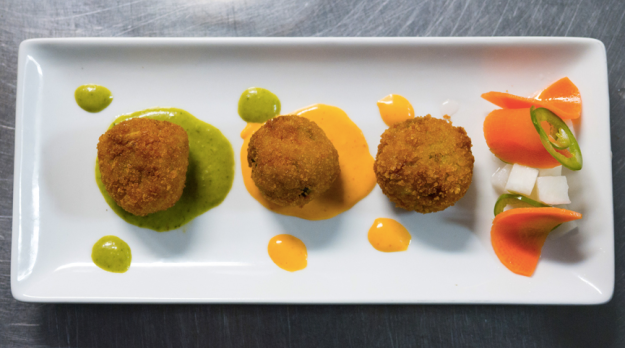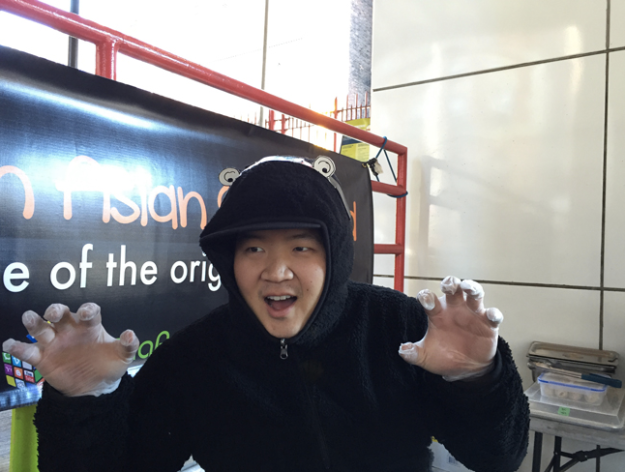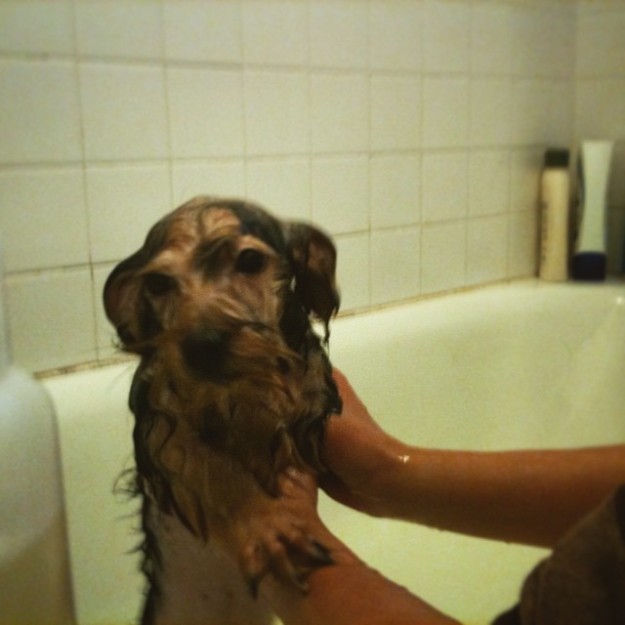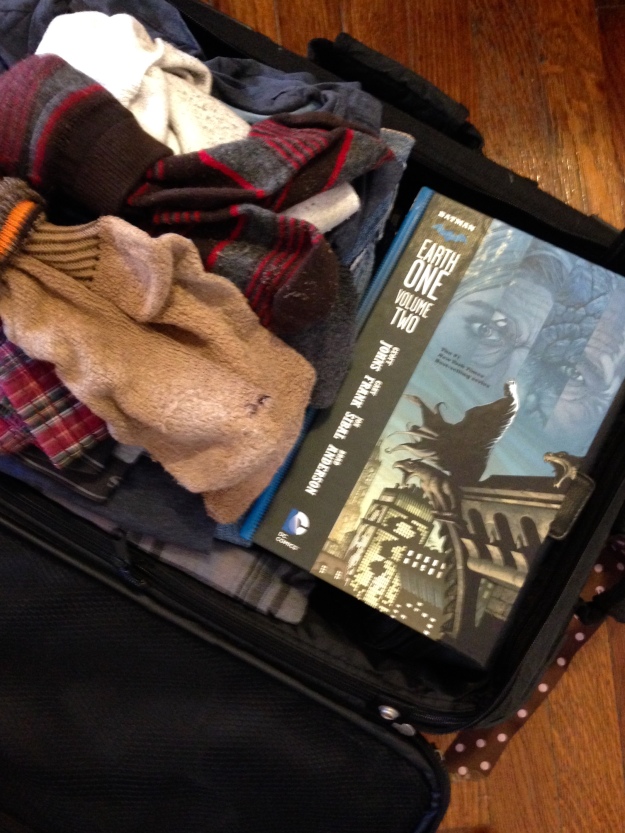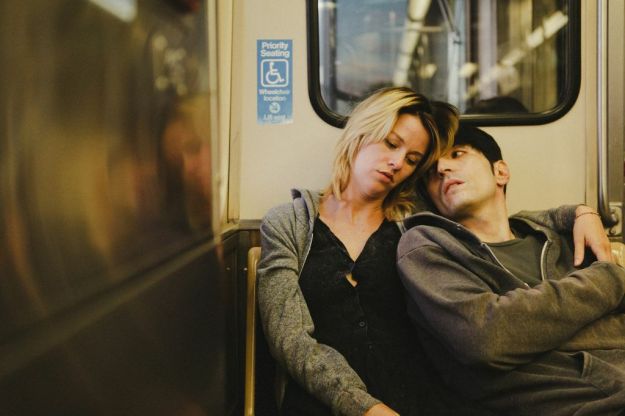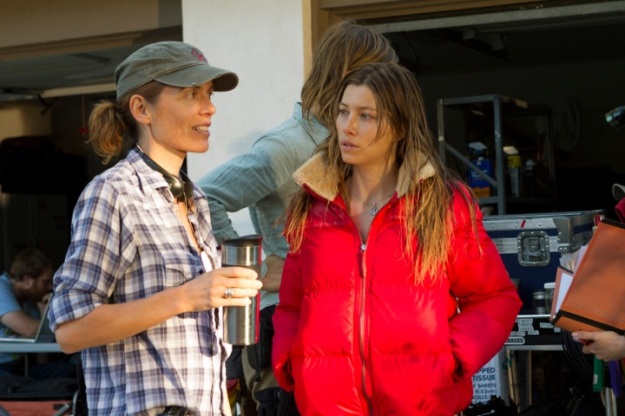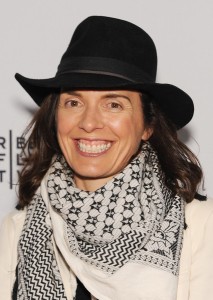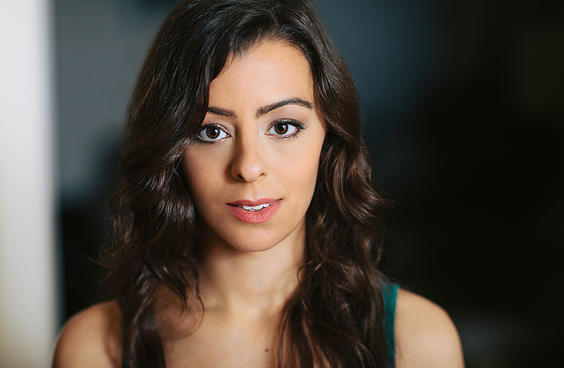
Collin on set, with lead actors David Dastmalchian (also the film’s writer) and Kim Shaw.
Hey, Kids. I’m going to keep the intro brief — because this latest Coffee with Creatives is a bit longer than the last. I’m still experimenting with format. What you’ll read below is more of a direct transcript of the podcast version of the feature, which doesn’t yet exist. I am working on it. Most likely, we’ll continue this way for a several more weeks, until I can figure out how to work the podcast into my schedule and cover its costs. More on that later.
I had a great talk with Collin Schiffli, for this installment. Collin directed the South by Southwest (SXSW) ’14 Award Winning film Animals, from a script by friend and collaborator David Dastmalchian (also the male lead in the film). It can be a tough one to watch, but I really enjoyed (and definitely respected) the courage and authenticity Collin, David, and team brought to the story.
Here’s a transcript of our talk. I hope you enjoy it. Let me know what you think about this format. If it’s too long — we may end up keeping things this way for now, anyway. But, eventually, there will be audio as well.
Animals is currently available on VOD — and still in theaters, in some cities. Per the film’s site:
Bobbie and Jude are a young couple living in their broken-down car parked alongside Chicago’s Lincoln Park Zoo. Their days are a continuous ritual of theft and scoring until they must confront the difficult truth of their relationship after one of them is hospitalized.
Check it out if you like what Collin has to say. Thanks for reading.
—
*Note: Italicized text is Michael speaking (probably for too long)*
What’s your primary mode of creative output?
I grew up wanting to do this forever: wanting to make movies, wanting to tell stories. I think it kind of extends from learning how to articulate my passions and my desires through visual media. You know, I love to draw, to paint and to kind of watch things on TV and movies — just anything visual I love to try to recreate it myself and turn it into my own world, you know?
I think as I got older and started realizing that filmmaking to me was a way of combining all aspects of these parts, and using that to express myself and articulate my desires and my passions of wanting to spread messages, tell stories that are relatable and communicate ideas. Things that don’t necessarily do as well just speaking through spoken word. And I think that kind of why I ventured down this road and why I chose this as my medium to express my — not necessarily only my ideas — it’s much more that I don’t just want to pass messages constantly. Just finding ways to relate, even if I don’t know what that is exactly what that reason is — if that makes sense?
Yes, sure. I like it. I like your answer because instead of just saying filmmaker you kind of dove into the whole visual storyteller thing.
Yeah, I know it’s a lot, but it’s really — I think “filmmaker” encompasses that. I don’t like to say “Director”, I guess is why I am giving that whole answer. Of course, I love directing. It is my main thing. But that filmmaker side, that “all-encompassing” way of learning to collaborate in all those arts, it comes together as one.
I agree. I kind of came around — many, if not the majority of filmmakers feel this way but, I came around the same way to “Storyteller” for sure. Over time definitely “Visual Storytelling” felt like the best way to…I shouldn’t say just visual because, obviously, it’s film. There’s a lot of aural work too. I did notice even very early on in Animals, the sound design is very sharp and there is especially in the first half a lot of music.
What are you currently working on?
I am finally putting Animals to rest in a way, letting it do its own thing now that you have it living and breathing. It’s out there and of course I am wrapping things up.
Now I’m turning my attention and focus to a couple different projects. I’m definitely someone who wants to have my hand in as many things as once — trying to see which track goes first really, because you never know. It seems like I am doing one thing and that’s going, and suddenly it comes to a halt and the next thing is going and you just kind of hop from one to another.
But I am working with my brother who is a screenwriter, his name is Brandon Schiffli. You can probably Google him or find him on Facebook if you want to find out more about him. We kind of, in a way, want to do that “Coen Brothers” approach of filmmaking, eventually, and so we have our projects. One in particular — I won’t go too into detail. It’s actually a step up. It requires a little bit more of a budget so it explores more of a fantastic world, kind of diving in a little more to I guess a “marketable” place — not that that’s our goal but a wider audience concept type of film.
That’s kind of the way we want to go. Also, on the side, David and I want to keep working together, and always do, and he’s got a project that’s similar to Animals, but very different in ways. It dives into sensitive subject matter and deals with poverty again, on a totally different level. We have that. We keep bouncing back and forth. Whichever one takes off first.
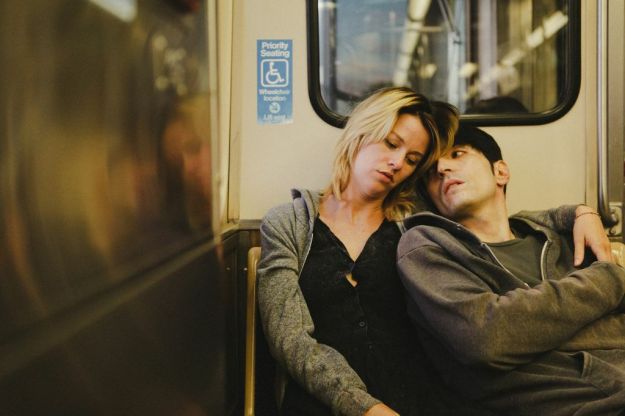
With limited time and money for rehearsal, David and Kim spent a day exploring Chicago on the train.
Can you briefly summarize how the film came to be, how you got involved, how the ride has been?
Dave and I met in Chicago. I went to school at Columbia College and he had already graduated, he is a couple of years older than me. He basically was still living in Chicago, was getting back into the acting scene which, at the time, I didn’t know what he was getting back into. For me, I thought that’s what he did. He was an Actor and I didn’t know at the time that he was a recovering heroin addict, had fallen off of the face of the Earth and finally was recovering and was getting back into acting. He had landed a role in The Dark Knight.
When I first connected with you and your brother on Twitter, I think it was because of one of your Producers, Amanda — we had been following each other. And I saw — that’s how I found out about the film. It’s funny because just the week before I had re-watched The Dark Knight just to refresh myself while I was working on a script that had some ambition with such a big scope and size. And I remember watching that scene and feeling like…this guy is bringing everything to his short scene. Like, this is a guy who has a lot going on. It was really great seeing that you guys had this project.
What you said is exactly what I felt when I originally saw the movie. Subconsciously, when you are watching that movie — and I saw it a handful of times in the theater, and I don’t know if I was really saying this to myself thinking “there is something about him, there is something going on for such a small role” that felt so pertinent and, sure enough, weird fate I guess…
…I was doing a project my senior year and it was a short film, and he was fresh in my mind and I was like “I wonder if we could get that guy?” Not knowing anything about him, not knowing who he was, and he seemed perfect for this role. And sure enough he was still in Chicago and said he would love to work on the film and he came out and he did it and we hit it off. We moved out to LA at the same time and kept working on little projects and staying in touch until a few years had gone by and he said: “Hey, I have a feature film and I would love for you to look at it to see if you are interested in it” and I said absolutely.
I was definitely curious as to what it was going to be about. Like I said we had connected so well and he was really making some good progress in the acting world and when I read the script I was really actually thrown. Because…a drug movie…that is so specific. Like, do I really want to be associated, especially my first film, with a drug-type movie which is really a genre in itself.
So I asked him: “Why do you want to film this story?” And that’s when he told me and he opened up and I was very shocked but he said: “This was my life for a while.”
It was almost too surreal to grasp. At first I thought it was crazy. You know, for us, in terms of our friendship — that really brought us closer and I think that’s what I needed to really get on his level and be as genuine and honest as I could. That was about three or four years ago.
It took us a while, in between jobs and on off-hours, we kept working on it — refining the script and figuring out how to raise money. Finally it came about and all happened at once, two summers ago. Once we did get the money it all snowballed. It was from the ground up. Me, Dave, and Dave’s girlfriend at the time (now they are married) — it was just the three of us and my brother would help once in a while. We worked from the ground up trying to make it all come together.
Animals has a very immediate feel to it — which makes a lot of sense, given the story and subject matter. Was that apparent early on in the screenplay?
It was apparent. When I first read it — he wrote many drafts. I was brought on very late in the game, so he kept it very to himself over the years of writing. I think the final draft that he landed on, and felt comfortable sharing with people, pretty much is the draft we shot.
I know he changed some subtle things. Once I got on board we talked about stuff. For the most part, when I had read it and as we worked on it, it seemed like — my goal for any film is for it to feel as natural and as grounded as possible ,especially because I think I want to make bigger films.
I do want to make films that have elements of fantasy, or sci-fi, or things that are a little outlandish — and I just love when you can make those feel so grounded that it seems like it exists in the world. I think a part of that, for me, is making it feel immediate and having it have that “in the moment” feel, as naturally and as authentically as possible.
I was very happy that the script had that. The script was written in a way that it was cyclical, the lives of these characters in general is so — their everyday is so in the moment. It’s: “This is what has to happen every day. There is nothing else. We get up — we do this. We try to get money, we score and we do it again.”
For me, especially, not knowing this world, and seeing that movies — usually they glorify it or make something about it seem super-cool. Or else they’re preachy and over-the-top. I wanted to strip it down and make it feel — you are literally in the moment with the interactions of these characters. Just something that is very present and it is happening on the fly. I want to find that in other films. I think this film, especially, the story and the nature of it — he had written about this cyclical thing. In the script, originally, they went to the projects even more. They almost did it too much. I thought: “We don’t need this. We get it at this point that they keep doing this thing over and over. So I think we tried to shave all of that back. Does that answer?
It does. I am in post on my first feature right now and we took a really — it was one of those decisions where we decided that we had to keep moving. We wanted to make something. I am kind of used to…I am very DIY, low-budget, self-taught. We raised 20K and we did it. I am still not completely sure how we pulled it off, especially in NYC, but we tried to make it in a similar way. To make a grounded, immediate film, but naming and embracing our constraints to keep things simple, in certain terms, so we could explore things very deeply in other terms. When I was thinking about how to talk about this, I actually wrote “immediacy” and “simplicity” right next to each other. While it seemed, in your film, there was obviously a bigger budget, when I was trying to think about it in terms of putting myself in your shoes as a filmmaker, in terms of coming up with questions, I was wondering — this is my follow up question…
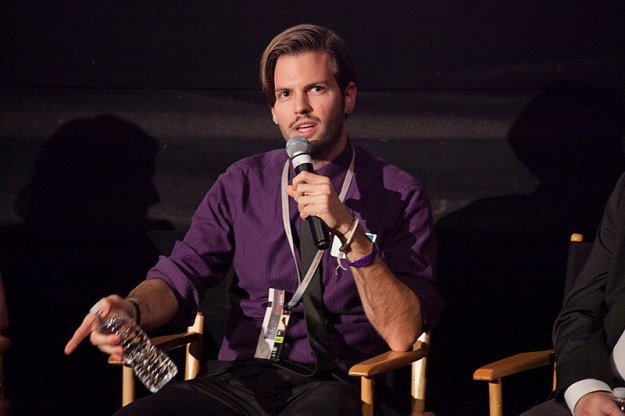
Collin delivers A’s to Q’s.
Do you feel like you and your talent were able to dig deeper, in terms of performance and photography/editing because of the constraints afforded by that immediacy?
I think that is one-hundred percent it. I think you are right. Taking that and applying it to all of those facets, to all of what we need to accomplish with our DP — in a way it was cool. I don’t know if I realized it at the time, but like I said — I want that feeling for so many other things.
Even in a different situation, I think I would have found a way to include it anyway. I think it was a way for all of us to understand the world and to make it not just to make things as cost-effectively as possible — but because there are those strengths that you have.
You are always going to have constraints on low-budget things. It’s better to use that not as a crutch but as a helping hand, to apply that way of thinking, even in the way all of us approach a scene or a moment, like when the actors approached the more-difficult matter.
It’s about trying to make it feel in the moment, but still feel big and cinematic, but still also intimate and simple and small. All of us, luckily, after at least a week of filming — and as much pre-production as we could get going into it — once you experience doing it, it’s like: “Wow. We do have to rely on this in-the-moment approach.”
After a week of shooting, I think we found our groove, being on the same page, especially Dave and Kim. In terms of acting, I think it helped their awareness of what they are doing. It helped surround them, made it more authentic and more believable.
Yeah. I thought they had a great chemistry.
That was tough to find — that was the biggest thing, their chemistry. We had no time to rehearse, so we kind of, we got them on the L one day and said: “Go ride it around together and go explore the city.”
But that was the closest we had to rehearsal. In a way — we plucked everyone out of LA and dropped them right in Chicago — and I think sometimes that works to help melt things away and immerse everything in the world.
What’s on the cutting room floor?
I have been revisiting that question a lot lately. The first cut, actually the assembly cut, was three hours long! I can’t even believe it. Most indie films that I worked on, up to this one, in different positions as an extra hand for films — their assembly cut is usually barely over 90 minutes. So it made me nervous.
You want to be able to cut things out and still have a movie without re-shoots or having to rely on too many re-shoots. I am sure it is going to be different on every project, for different reasons, but somehow our movie was three hours long and a lot of the stuff, thirty percent of the stuff I couldn’t wait to get rid of it because it was stuff that was fine in the script but then on the day — and there are a lot of reasons for this — on the day of the shoot the acting or something just wasn’t clicking, we stuck with whatever we had and it was the stuff that I thought: I want to get rid of this, it feels like an amateur movie or just something else.
So thirty percent of that got cut out pretty quick. In order to get it down towards 90 minutes, what we did — it happened overnight in a way. You should talk to my older brother — I keep forgetting you guys talked. He knows story structure so well, on screen. Better than me and he was like: “Here. This scene needs to happen so many minutes in, this other scene so many minutes in…”
That gave me the five to ten full moments that need to happen quicker. For example, they need to be shooting up for the first time in the diner at minute ten. At that point in time it was happening at 35 minutes. I thought: Man! That’s cutting out so much. But you just have to know that there is nothing to lose. You can always go back and put it back in.
The second we did that, it immediately cut it down to 90 minutes. The process was a blur. Looking back, I almost don’t remember, because it is such a stressful time. The whole “killing your baby” thing — all it came down to was getting to the story. Dave always makes fun of me because I say this and it sounds like I am bashing his writing because I don’t word it very well — but it’s almost like the script was a whole bunch of moments put together instead of necessarily being in a Hollywood structure or format, for lack of a better word, where there are act breaks, all that stuff.
It seemed, in a way, that with all of that stuff we were re-writing the script and cutting out what we should have when we were filming. Like we had this part where they sat down and were talking to a priest. They go to the church and they pose as wedding guests — there is a scene right there where the get caught by a priest and then he brings them back to the office and in a way it was kind of like a Ron Howard scene where he sums up the movie. It seemed like we weren’t ready to sit down and have this scene right now. It was only twenty minutes into the movie, and this isn’t really a movie that has this, but it was a pretty good scene and if we ever get a DVD out hopefully I would love to have that to be on as a deleted scene or something. But, yeah, it just felt like a different movie and that was the criteria in chopping things out and sculpting it. What doesn’t feel like it belongs? In indie films, especially, it is so hard to make it all feel so consistent. Because you still have low budgets and you shoot where you can and you get what you get, but I think you should whittle away the stuff that feels like it belongs in something else.
With my assembly, at least for this one — I would do the assembly cut for a scene and I would come back the next day and cut it down. So my assembly ended up becoming more like a complete rough. I think we are at 96 or 97 minutes and I have been away from it for over a month now and we are trying to be see if 90 is possible. I don’t want to force it, but we will see. I like talking to other filmmakers who have recently just been there, too, because this is my first time editing something on this scale and it has been a little intimidating.
Sure, of course. How does it feel to get away from it for so long and come back to it? Did you feel that helped clear your mind. Because that seems like it would kinda be a great feeling. Is it still fresh, or…
So, the first thing is that I actually physically blew out my elbows from juggling editing with my daily screenwriting with my day job. So that was part of it. But, also, I had a turn a couple of years ago where I started finally doing work that was really coming from the heart and from who I am as a person. And at that time I also started learning that I just need to take some time and space and take breaks. Usually in the indie sphere you are always struggling for cash and time and doing so many things, so it overlaps with that as well. I thought: let me take this time and this opportunity when I can’t afford an editor to just take a break and rest. But also spiritually, emotionally, and mentally — it is all still very raw for me. So I think it is two things. One is taking that break and I have talked to a few other filmmakers, and trusted friends who have read scripts in the past, who are probably going to help do a virtual — maybe combined with a physical — not a test screening but a round of review. Tell us your immediate thoughts and tell us what you think of this cut. I want to get — I do care more about getting it right for the film than right for my own anxiety about how it might go, so I guess we will see.
It’s so fun to just grow. That’s how we grow. We have to keep watching each other’s stuff and relying on each other’s eyes.
I have been surrounded by plenty of helpful people — and many were older so I think that really helped. But, now I just think: listen as much as you can. Who cares. Let everything else go for a second and hear what has to be said.
Yeah. It took me a long time to get to this place but I think it feels good for the work and the audience and everybody.
What do you get the most joy out of, and/or what would others say you’re best at, not including the above? Creative or otherwise.
That’s so interesting. I am actually grappling with that question a lot. It’s hard. My whole life, I have always been filming and goofing around, making movies and editing, and that was always my go-to hobby, in between things. Now I am almost doing that fully, 24/7 — I edit to pay the bills out in California, and it’s so weird to be doing all that 24/7.
I almost have to ask myself — what else do I do!? What else can I do now, to be a hobby outside of this stuff. This use to be my hobby and now it’s crossed that line where it is both. And you do get burned out and I get burned out a lot but you always get reinvigorated when you see some movie or some indie film that blows your mind and you think: “Oh! this is way!”
You go through those ups and downs. It is hard. I don’t know. It is kind of the same thing, but drawing and painting is soothing for me. And it is weird, so weird and bizarre — but I like food. I love exploring food and I am not a cook at all but that is an escape for me and that is a whole separate world. But other than that, at least at this time in my life, there is nothing else and I feel like I need something else.
I hear you. Especially when you’re — it’s a very delicate balance — I feel like I put so much effort in on a daily basis towards sanity and physical health, just juggling the two tracks of paying the rent and making the movies.
It’s rough. It’s a rough line to be battling. Obviously there are millions of other worse things. But, you know…
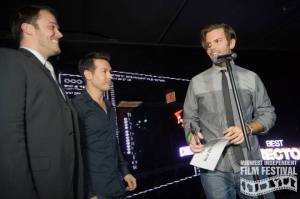
Collin at the Midwest Independent Film Festival.
What’s the biggest challenge you have faced, or are currently facing, at this point in your creative career? How have you addressed it?
My biggest challenge is always trying to just make ends meet and at this point in time to keep stepping up to the next level in my career that is pushing me to that next stratosphere of filmmaking. Whether it is getting into — I don’t know if I will ever be a studio film maker but I live in Hollywood and am trying to enter that world of bigger filmmaking. The challenge is trying to constantly — I do have an agent and a manager, now, which is very amazing and I never thought that would come about, and from this movie it came about. It is all very new to me and it’s still something I am learning and trying to deal with, with how to get them to understand what I am trying to do as a filmmaker.
And the challenge is getting in these rooms — but it’s amazing that I am getting in these rooms, with companies that are making real movies, you know movies that we all see with real actors — it is all so surreal to me. Not that our movies aren’t real, but…that next level of professionalism.
The challenge is the expectation of getting around and getting my name out there and showing my ability and showing my work ethic and I am at that next level but I am still not being paid yet. I am showing animatics and little storyboards and sequences to further a pitch or a project. That I am doing with my brother and what not. And it still doesn’t seem like I have stepped into that level.
There still isn’t money. And that’s not what I want but that’s the challenge of being able to keep distancing myself from these jobs or the editing jobs or the various jobs that I do that are freelance things that just take your mind away from that bigger world. But I still need them so I’m caught in between, where I don’t feel like I am past that — how to pay the bills. And I know we all deal with that and maybe we won’t get past that but it would be nice to not have to be working around that.
Like you said — you’ve got to balance it. You come home from a day of editing and somehow have to edit. And my manager will ask: “Can you throw together a tone reel for this concept?”
Well, I am doing that now. I am editing and I am editing, and it is very soul-sucking and that’s the challenge, is how to balance it all. There is always going to be that balance. Even hanging out with friends and family. How do you meet people? How can you just think — how can this person help me? And if they can’t — move on? How do you not have that attitude and remember to be in the moment. You’re always trying to get to that next place. But sometimes you are in that next place already, it’s just about keeping your head grounded and focused and not necessarily worrying so much about where the next paycheck is coming from and to keep plugging away.
I like that, and I can see how it would be especially a bigger challenge in LA, especially meeting people. I feel like the last couple of years…I feel very fortunate to have…starting from online, which is a theme of my film, in a way…but it’s been wonderful to start meeting people and forming an authentic connection. I think everyone in our business…as you grow older and become a professional of any sort you become — everyone is going to need something from other people. But other people are going to need something from us. It’s like always a basic human thing. So, I think that there are — you know I have been on both sides of it. Someone who has been hiding behind fear — like: I’m not doing that bullshit…the art will speak for itself…and, also…trying too hard to impress people. Just generally worrying too much about that. What you are saying, it is true. Not just staying grounded but staying authentic is hard. Especially when you care so much. Being patient about allowing that to happen on its own, as you meet more people that you jibe with.
Yes, absolutely it is a very patient process. And you just have to remember that. It is so hard.
It’s one of the most frustrating things about an otherwise fulfilling job that I love — which is how huge films are and how long they take and then within a career how hard it can be to keep growing and keep scaling up, and just because of how much money it costs and how many moving parts there are and how much competition there is and how much saturation there is in the market. You have to really develop a thick skin which is ironic because you have to be permeable to the art.
There are so many back-and-forths, on all different levels.
This screenplay that I was working on, when I was rewatching The Dark Knight — it’s a super hero spec and the two main characters — one is a Sue Storm type and she is all about blocking off the world from her. And the other is a guy but he’s a Kitty Pryde type, where he is physically permeable. As we were talking, I thought: there might be a couple of metaphors going on with that.
Even if it that is accidentally coming out for you, it is awesome.
What’s the biggest mistake you’ve made as a creative?
I’d say the biggest one is…growing up…we are in that generation where you wear all of the hats and you have to take every role because that’s how you started. That’s what you do. And you slowly get more wise and involved in what you are doing, in your process, then you start meeting people who aren’t just your friends, people who have that knowledge that you don’t have, and want to combine efforts with them. And for me I think the biggest mistake has been underestimating how import the collaboration process is. Especially film, it is such a collaborative process. Everyone always says that. That it’s a collaborative Process. And you always think: “Yeah, yeah..I know.”
But when you finally really do it, you realize how valuable everyone’s time is and what their talents are, and what their abilities are, and how they can elevate your weak points, and you realize basically how important it is to rely on these people and know that this is what they do. They can just elevate your work. I think throughout the years the biggest mistake has been taking on everything with a hard head — not arrogantly. I don’t think I have ever been someone who says: “My way way, or the highway.”
At the same time you get angry. You have that chip on your shoulder. You hear so many stories growing up about George Lucas and everyone who has been depressed by someone, and are always repressed — the artists are always the victims. I think that’s always gonna be there. I think I am always going to have that frustration, but I think my mistake in the creative process has been taking on too much, trying to take on too much, and finding ways to make it my way. Now, letting that go, especially having been on my first film, where I had to rely on so many people — it’s learning to let go of that. Keeping a strong vision of myself and keeping my voice intact, but at the same time knowing it’s okay to not be the ultimate puppet master or whatever. I think that’s always been it for me. It all circles to that anger. Whatever anger I have my mistakes always stem from that.
When you were talking I was recalling…my wife, we work together to produce our films and she’s a really talented actor so usually when we are assessing our resources I will write either the main role or one of the main roles specifically with her talents in mind. So we have shot three projects together and the feature was our third.
We were on set, on the first week, and it was the first…things were going pretty smoothly but I think it was our first…gratefully…the first time we fell behind. It was the first time there was a problem. A real problem, which was…we were shooting in a location that let us in for free but they were open and we were shooting during a very sleepy time for the most part at this cafe and they were great about turning off the music, and we had a corner to ourselves and the sound guy said we could manage it.
Still, there were a lot of challenges because of that. And it was becoming clear that we had to reassess either our shoot schedule or cut some stuff or both. So I got overwhelmed for the first time and I stopped and I asked a friend of mine — who is also a filmmaker, he was doing what you were saying before, he was on set lending a hand, kind of a consulting producer on the project helping when he could and he was our A.D. for the day — and it was one of those moments on set where you know everyone is looking at you and you have to make a decision.
And the decision I had to make was to stop and put a pause on everything and I asked him for help, to have a side meeting as an A.D. Eventually, we handled it. We ended up talking to the owner and we went back and caught up. We were ahead a couple of days later and we went back. We finished the cafe stuff and it worked out fine. My wife came up to me later and said — and it was a touching moment for me — and she said: “I’m really proud of you for asking for help.”
Wow. I know that feeling and it’s amazing that she recognized that. That must have felt amazing.
It’s probably because she has been harping on the point for a couple of years.
Right, of course. So true. Exactly what I am talking about.
What general mistake(s) do you sometimes see peers make, that you wish they’d address?
Having worked now — not as the director — on a lot of projects, of all sizes, you do see what people are doing. Your friends and your peers and your non-peers…people you strictly work with on that project alone. And you are around them and you’re seeing their process and you think: “How would I do this differently?”
And there are so many thought processes going on but you know: I am a hired hand. I don’t really have a say. And I keep my mouth shut. I would never jump out and say something, depending on what type of people I am working with. But, there are so many projects where I would just look and think: “Man!”
I wish I could say — this is all you gotta do. From an outside perspective. From someone who is not attached.
Are you talking about being more proactive about seeking objective feedback?
Exactly — people don’t think to do that. Really stepping outside of yourself and disconnecting yourself from your project. Disconnecting yourself and getting an objective point of view. I know a lot of people who are so hard-headed about all of that. It’s like they take on the burden of it all so personally, and it’s their vision and their thing, and their everything, and I just want to say: “Man — step back for a second and disconnect.”
I think it’s hard, and likely that the project is going to suffer from that scenario. Not a hundred percent likely, but, it is something even in my own work — I have striven to make changes in my personal life the last couple of years. I think that I used to have this fear that if my film isn’t the most important thing in my life right now, I am not doing it justice. What I have found, and what I have heard other people also say — people with more experience, for sure — is that it’s actually the opposite. It’s not that the film is any less important. It’s arguably more important, if you are taking care of yourself in such a way as that. So that this film isn’t about you it is about the film.
Absolutely. And I think it should be about the film and not about you. You should make your personal life separate from the movie and all of the inner workings of what is happening in your daily life. They are separate, for sure. It should strengthen you, you should learn to strengthen that side of yourself in the process. And I know that — we all want to have that — we hear the story of Apocalypse Now and you want to get lost in this jungle of what we are doing and make it seem like this big important thing that we obsess over. That is not all that matters. As you get older and start maturing you start realizing that, and seeing that what you are doing is important and you want to make it important. But everything else around it has to be equally the same or it is going to suffer.
And it is also categorically not the only way to excellence. You look at someone like Nolan who in interviews or testimony from collaborators — or just looking at the product, thinking about the lack of horror stories or the lack of drama behind it all — the guy just works and he comes in under budget and he is focused.
He seems so mechanically professional about everything. It all is so smooth and he makes it seems to easy.
Yeah, and similarly, coming from a different angle, I have heard of a few people who have worked with Soderbergh, and they just basically expressed awe at how self-possessed he is and how calm and focused, and not a jerk or not manic. And it’s hard because maybe that can feed the machine, but…it is complicated, I guess.
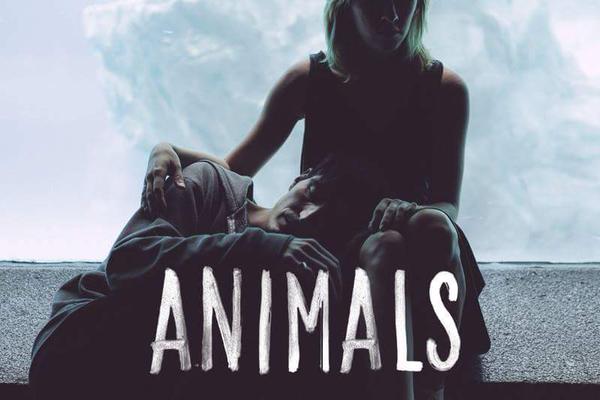
Animals is available on VOD and still in select theaters.
What are you most proud of, in your career or in life?
I’d say, very generally, I am most proud of the fact that I stuck to what my childhood passions and dreams were. I am fortunate that it hasn’t changed. My desire of doing this hasn’t changed, which is great. That’s hard enough for some people to just be in different paths. Somehow, my goals haven’t changed. So I am proud of that. Through the crazy ups and downs, and trying to figure out how to get from Point A to point B, generally I haven’t given up.
There have been so many times where you do just question: “What am I doing!?”
It’s the idea, the fact, that I have taken each step, and taken it for what it is, and gone through it, and knowing I got through it. And I am not going to do it the same all the time and I am not going to get ahead of myself. Of course, you are going to get angry or frustrated. Why am I not doing this, or why did that happen, but, just relying on, taking comfort in the fact that I am where I need to be at the moment and not stressing about it.
Otherwise I would have deviated and done who knows what. I am very proud of the fact that one of my goals was to make a feature before I turned thirty. Having accomplished that, I can’t believe it happened. It feels like a miracle to me. Being able to do it in a way that’s hopefully inspiring to others, and finding inspiration in people who have gone before me, and just keeping it all balanced — I am very proud of that. Staying grounded and being excited about it.
I had that same goal and I failed, but I was 30 when I shot mine and I think it was a testament to how I have grown because I just thought: This is fine.
It is fine. You are here you did it! You realize that sometimes those goals don’t need to be as literal, and I guess that’s what I learned from that. Yeah, you want them there somewhere, you want that goal and idea, but you have to remember other things happen. You have to remember that other good stuff that is happening as a result.
How did you evolve to this point of view? Is it mostly experience or do you have a philosophical or spiritual or a practical approach?
It’s definitely all of that. Luckily growing up — I grew up in Indiana so I do have a midwestern viewpoint of the world in some terms. And I know that doesn’t really matter. I have a very different way of thinking from many midwesterners. But at the same time, I grew up in a very connected home that is very put-together. I think the morals and the lessons that I learned from my parents and the people around me, family and friends — I definitely apply that.
I grew up technically Catholic and I have branched out to more — I am very spiritual. I think that my philosophy has come — from even in Animals, I kind of really try to dive into the idea of what it really means to be a leader. I try to think of who are the good leaders, the leaders who set an example and the ones who do the work and seeing them living it out.
When I look back at the people in my life who were like that, parents and grandparents and stuff — they were the people who were youth group leaders and camp life leaders and I was always impressed by them. They were only, say, 26 at the time, and I was in High School. They were 26 or 27, and that’s pretty young, but at the time they seemed so much older and more mature, and in my head they had both a worldly view — a cultured view — but they were also very grounded and had a personal, simple way of looking at things, at how to be an inspirational leader, how to push you.
Those are the people that I try to pattern myself after, and my approach after. A lot of those leaders were all about religion and discipleship and I almost apply that to my approach as a filmmaker. Knowing that you are going out and not just being someone in charge on a film set. You also know what your movie is saying, and how you are going to be a person of influence in the world. We don’t just make movies to reap the benefits of being a cool filmmaker. I think: “How will I be someone of influence? Say wise things?”
In person, I am a terrible speaker, when in front of people. How do you show young people how to be a positive influence to the community? You can do that on any scale. I am trying to always remember that it’s all about relating to people and talking to people and still trying to grasp that myself. Why do I want to be a filmmaker? And after a while it’s not just because I want to make movies. There is something there about being someone of influence — not of power but of humble power. The leaders in history who have really made a difference are the ones who whether you believe in Jesus or you believe what Gandhi did was good or Martin Luther King — I always found myself studying those people. I don’t wanna be pretentious in that matter but there is something in there. There is something important about all of that.
I completely agree. I think the fact that some people, which is fine, some people will make films, because it’s cool or because they like being in charge. It’s normal to worry and want to constantly weigh that against “am I doing the right thing” — in terms of is this egoistic or an egotistical decision or not. I think it’s great. The fact is, that when you are making something on the scale of a film, in terms of all of the resources, the collaboration, and participation — especially in today’s climate, that comes from the audience as well — you are shepherding something that is bigger than you. To do that while looking at leaders who balance that with a equanimous or grounded outlook is useful.
Do you meditate or anything like that?
I don’t. I feel like I am someone who needs to. I found that I present myself, as best as I can, as someone who is very calm and observant. I am not a person in a room who — in film school especially I was the one who never talked. I would listen and participate, surely, but I could never just say: “Well, here is this and that! This is what I want to do!”
And, so, I think because I am quiet I bottle things up and am a person who lets things set in and I try to handle it myself. I think I am someone who needs quiet time to reflect. I don’t know if it is meditating or if it’s exercise. I do live in California and I haven’t found a church or anything, but when I go back home I quickly connect with my friends who still are involved with the community whether it’s church functions or things like that. That is a form of meditation for me. I am still trying to find something gives me that peace of mind.
Especially off of my experience editing this feature — I find editing to be alienating and a debilitating process for me, mentally and spiritually.
I totally agree with that!
I think I wrote about it on the blog — I turned into this cave person.
You lock yourself away and you realize you are not communicating with people!
Not great.
Where can we find more info about you and your work?
I don’t have Twitter. I have Facebook. I don’t mind people reaching out. I get a lot of good messages from people on Facebook and I am happy to engage with them.
My brother is on social media and he loves that stuff. I am fine with it. I just get angry that I can’t keep up. We’re at Schiffli Films on Twitter and Facebook. We also have a website: schifflifilms.com.
Those are the best way to reach us. Animalsthefilm.com as well, to get a hold of me and Dave. I know Dave is happy to talk, too, and we are kind of a triangle. He is on Facebook. That’s the best way to learn about us and keep up with us.
In terms of the film, it is on iTunes and in select theaters and on Amazon. It will be on Showtime in November and hopefully soon on DVD!
—
 Like my style? Subscribe to my list for advanced/exclusive (and free!) access to new (creative) content produced by yours truly. I send one email per month
Like my style? Subscribe to my list for advanced/exclusive (and free!) access to new (creative) content produced by yours truly. I send one email per month
